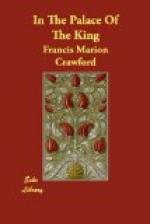The King was one of those men who seem marked by destiny rather than by nature, fateful, sombre, almost repellent in manner, born to inspire a vague fear at first sight, and foreordained to strange misfortune or to extraordinary success, one of those human beings from whom all men shrink instinctively, and before whom they easily lose their fluency of speech and confidence of thought. Unnaturally still eyes, of an uncertain colour, gazed with a terrifying fixedness upon a human world, and were oddly set in the large and perfectly colourless face that was like an exaggerated waxen mask. The pale lips did not meet evenly, the lower one protruding, forced, outward by the phenomenal jaw that has descended to this day in the House of Austria. A meagre beard, so fair that it looked faded, accentuated the chin rather than concealed it, and the hair on the head was of the same undecided tone, neither thin nor thick, neither long nor short, but parted, and combed with the utmost precision about the large but very finely moulded ears. The brow was very full as well as broad, and the forehead high, the whole face too large, even for a man so tall, and disquieting in its proportions. Philip bent his head forward a little when at rest; when he looked about him it moved with something of the slow, sure motion of a piece of mechanism, stopping now and then, as the look in the eyes solidified to a stare, and then, moving again, until curiosity was satisfied and it resumed its first attitude, and remained motionless, whether the lips were speaking or not.
Very tall and thin, and narrow chested, the figure was clothed all in cream-coloured silk and silver, relieved only by the collar of the Golden Fleece, the solitary order the King wore. His step was ungraceful and slow, as if his thin limbs bore his light weight with difficulty, and he sometimes stumbled in walking. One hand rested on the hilt of his sword as he walked, and even under the white gloves the immense length of the fingers and the proportionate development of the long thumb were clearly apparent. No one could have guessed that in such a figure there could be much elasticity or strength, and yet, at rare moments and when younger, King Philip displayed such strength and energy and quickness as might well have made him the match of ordinary men. As a rule his anger was slow, thoughtful, and dangerous, as all his schemes were vast and far-reaching.
With the utmost deliberation, and without so much as glancing at the courtiers assembled, he advanced to the throne and sat down, resting both hands on the gilded arms of the great chair; and the Queen took her place beside him. But before he had settled himself, there was a low sound of suppressed delight in the hall, a moving of heads, a brightening of women’s eyes, a little swaying of men’s shoulders as they tried to see better over those who stood before them; and voices rose here and there above the murmur, though not loudly, and were joined by others. Then the King’s waxen face darkened, though the expression did not change and the still eyes did not move, but as if something passed between it and the light, leaving it grey in the shadow. He did not turn to look, for he knew that his brother had entered the throne room and that every eye was upon him.




